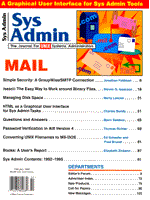
Listing 1: isascii.c
/* isascii.c -- Copyright 1995 by Steven G. Isaacson */
#include <stdio.h>
#include <fcntl.h>
#include <ctype.h>
#include <sys/types.h>
#include <sys/stat.h>
#define BUFSIZE 2048
#define MAX_FN 256
#ifndef TRUE
#define TRUE 1
#define FALSE 0
#endif
char *help[] = {
"-e echo filename even if only one file",
"-F [filename] file containing list of filenames",
"-v reverse isascii() check",
"- read filenames from stdin",
"",
"isascii checks for ascii characters in the specified file(s).",
"If non-ascii characters are found false(1) is returned,",
"otherwise true(0) is returned. When only one file is specified",
"there is no output unless the echo flag is used.",
"",
"If stdin, a list of files, or if more than one file is specified",
"on the command-line, then the ascii files are echoed and non-ascii",
"files are not. Exit status is always true.",
'\0' };
char *usage_str="Usage: isascii [-args] [filename(s)|-]";
int reverse=0; /* global for -v flag */
main(argc, argv)
int argc;
char *argv[];
{
int i;
extern int optind;
extern char *optarg;
char *options="v?heF:";
int c, errflg=0, echo=0;
char stdinfn[MAX_FN];
FILE *stdinfp;
stdinfn[0] = '\0';
if (argc == 1) {
fprintf(stderr, "%s\n", usage_str);
exit(1);
}
while ((c=getopt(argc, argv, options)) != EOF) {
switch (c) {
case 'F':
strcpy(stdinfn, optarg);
break;
case 'v':
reverse=1;
break;
case 'e':
echo=1;
break;
case '?':
case 'h':
default:
errflg++;
break;
}
if (errflg) {
show_help();
exit(0);
}
}
if (stdinfn[0]) {
/* input is coming from a file */
if ((stdinfp = fopen(stdinfn, "r")) == NULL) {
fprintf ( stderr,
"*** Error: could not open: %s\n", stdinfn);
exit(2);
}
file_or_stdin(stdinfp);
}
else {
/* input from command-line or stdin */
for (i=optind; i < argc; i++) {
if ( argv[i][0] == '-' ) {
file_or_stdin(stdin);
continue;
}
if (i != argc - 1)
is_ascii(argv[i], TRUE);
else
exit(is_ascii(argv[i], echo));
}
}
exit(0);
}
/* ================================================= */
/* show help page */
show_help()
{
int i;
fprintf(stderr, "%s\n", usage_str);
for (i=0; help[i]; i++)
fprintf(stderr, " %s\n", help[i]);
fprintf(stderr, "\n");
fflush(stderr);
}
/* ================================================= */
/* get the list of files from a file or stdin. */
file_or_stdin(fp)
FILE *fp;
{
char buf[MAX_FN], *retval;
/* for each name in the list, call is_ascii() */
while (
(retval=fgets(buf, MAX_FN, fp)) != (char *)EOF &&
retval != NULL ) {
buf[strlen(buf) - 1] = '\0';
is_ascii(buf, TRUE);
}
}
/* ================================================= */
/* read the file looking for non-ascii characters */
int is_ascii(pfn, echo)
char *pfn;
int echo;
{
int fd, i, n;
char buf[BUFSIZE];
if ( (fd=open(pfn, O_RDONLY|O_NDELAY)) == -1 ) {
fprintf(stderr,
"Error: could not open: %s\n", pfn);
fflush(stderr);
return(1);
}
switch (reverse) {
case 0:
/*
* normal case is not reverse. if non-ascii
* char found then test has failed
*/
while ((n=read(fd, buf, sizeof(buf))) > 0 ) {
for (i=0; i < n; i++) {
if (!isascii((int)buf[i]) && buf[i] != EOF) {
close(fd);
return(1); /* failure */
}
}
}
if (echo) printf("%s\n", pfn);
case 1:
/*
* -v flag was used. Now if we find a non-ascii
* char the test is a success.
*/
while ((n=read(fd, buf, sizeof(buf))) > 0 ) {
for (i=0; i < n; i++) {
if (!isascii((int)buf[i]) &&
buf[i] != EOF) {
if (echo) printf("%s\n", pfn);
close(fd);
return(0); /* success */
}
}
}
}
close(fd); /* we're at EOF */
/*
* return success, unless -v was used, in which case
* we failed to find non-ascii values
*/
return(reverse);
}
/* End of File */
|